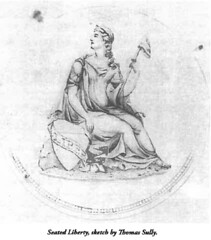
PREV ARTICLE
NEXT ARTICLE
FULL ISSUE
THOMAS SULLY'S INFLUENCE ON U.S. COINS AND CURRENCY
Bruce Bartelt submitted this note to me on December 28; unfortunately I was unable to get it into last week's issue. Great topic - an exhibit of the work of artist Thomas Sully. Bruce discusses Sully's artistic contributions to U.S. coinage and paper money.
-Editor
Those interested in the artists behind the designs on U.S. coins and currency may like to know about a special exhibit curated by the Milwaukee Art Museum, Thomas Sully: Painted Performance. As described by the museum, "the exhibition is the first retrospective of the artist in thirty years, and the first to explore the artist's entire career in depth." Yesterday, my wife and I took the opportunity to view the exhibit.
While the concept of a seated Liberty for the coinage clearly belongs to Mint Director Patterson, the design executed by Gobrecht clearly owes its greatest debt to Sully's drawing but also includes elements, especially the position of the arm and the shield, from Titian Peale's. (The Milwaukee exhibit includes an excellent portrait of Titian's father, Charles Willson Peale by Sully). The exhibition of course makes no mention of Sully's involvement with the coinage, dealing as it does with Sully's painted works, and the coinage drawing would have been a minor sidelight to his career. It does, however, include one of Sully's portraits of Andrew Jackson that later became the source for the engraving on the 20-dollar bill.

As to Mr. Carmody's assertion that the seated Liberty design was "was largely determined by President Andrew Jackson", I would await documentary evidence. Teddy Roosevelt notwithstanding, I think to most presidential office-holders the minutiae of coinage design would be of passing interest. So should we really call this series "Gobrecht" coinage? His name is a convenient moniker as his work was the common denominator translating the images of Sully, Peale, (and later, I presume, Robert Ball Hughes' version of seated Liberty) into coinage dies. The inspiration however belongs elsewhere. What about the removal of Gobrecht's name from the base of Liberty? Is it possible Sully objected to Gobrecht taking credit for the work? The Milwaukee exhibit demonstrates Sully's keen awareness of the art market of the time. Sully created sample paintings as "marketing tools", and these always include Sully's initials TS and the date. Clain-Stefanelli illustrates and comments on a rather mysterious painting that reproduces the seated Liberty of Gobrecht's final design, but with Sully's initials TS and the date 1836. A subtle claim to authorship? Questions probably forever unanswerable. I'm sorry this note is so late: the exhibition in Milwaukee runs only through January 5, 2014, but then travels to the San Antonio Museum of Art, February 7-May 11, 2014. For more information on the Sully exhinit, see: Thomas Sully: Painted Performance (mam.org/thomas-sully/)
To read the earlier E-Sylum article, see:
ROBERT M. PATTERSON AND THE SEATED LIBERTY DESIGN
(www.coinbooks.org/esylum_v16n51a18.html)
The Numismatic Bibliomania Society is a non-profit organization promoting numismatic literature. See our web site at coinbooks.org. To submit items for publication in The E-Sylum, write to the Editor at this address: whomren@gmail.com To subscribe go to: https://my.binhost.com/lists/listinfo/esylum All Rights Reserved. NBS Home Page Contact the NBS webmaster 
|
